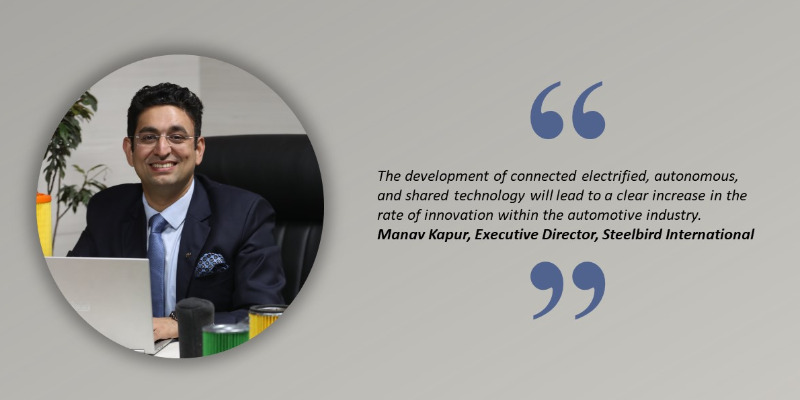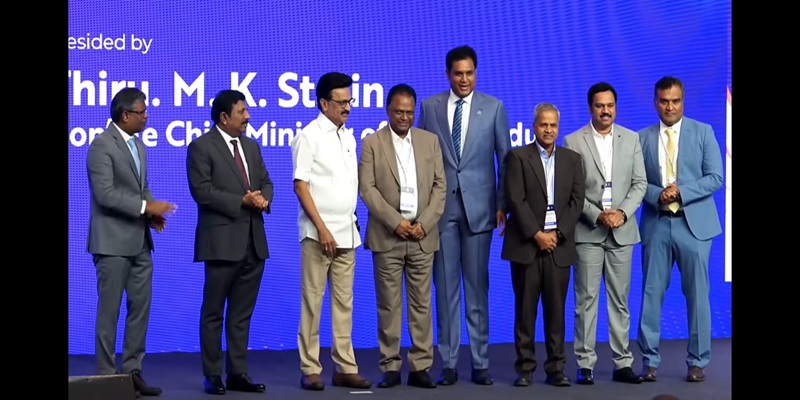Schedule a Call Back
Four auto sector trends to look at in the next five years
 Industry News
Industry News- Jun 28,21

India is expected to be the world's third-largest automotive market in
terms of volume by 2026 and is currently valued at $118 bn. Despite the
ongoing pandemic, the Indian auto industry has shown immense resilience
and is facing the challenges posed by the pandemic head-on. The
government is also taking adequate initiatives to boost the auto
industry by offering product-linked incentives, scrappage policy etc. Manav Kapur,
Executive Director, Steelbird International, delves into the automotive
sector rapidly integrating technologies in the coming future.
The
automobile sector has seen a drastic change over the past few years
with electrified, autonomous, shared, and connected cars. Technological
advancement has changed our perspective of visualising things. The
transformation of the automotive sector will be driven largely by the
youngsters and technically savvy generations. They would play an
important role in driving the transformation of the automotive industry.
While talking about technology, these are some of the trends that we
will witness in the coming five years;
Electric Vehicle
EV
market has shown dynamic growth over the years and will achieve a
tipping point in the coming five years. The Delhi government has also
started Switch Delhi Campaign and taken multiple initiatives to create
awareness about the benefits of electric vehicles. The transition to
emissions-free individual mobility could only be possible because of the
electrification of the vehicle. Electric vehicles will account for
about 10 per cent of new vehicle sales by 2025. EV sales, excluding
E-rickshaws in India witnessed a growth of 20 per cent and reached 1.56
lakh units in FY20 driven by two-wheelers. Amongst all regions in India,
Uttar Pradesh continues to have maximum monthy registered EV sales with
22 per cent of overall sales in India in April 2021 as per JMK
Research.
Autonomous/ Driverless Car
The exponential
progress made in artificial intelligence, machine learning, and deep
neural networks makes it possible to achieve what until seemed utopian –
namely the development of driverless/ autonomous car. It requires no
human intervention even in complex traffic situations. The global
autonomous cars market is expected to grow from $719.94 bn in 2020 to
809.15 bn in 2021 at CAGR of 12.4 per cent as per the Global Autonomous
Cars Market report. India is going to see a chunk of this action
accordingly.
Autonomous driving is an eventuality, of course,
where the vehicle is capable of sensing its environment and operating
without any human involvement. But it comes with its own set of
challenges.
Connected cars
When everything is
connected via the internet, then why can’t cars? Cars are becoming
smarter and integration of smart technology has been gaining popularity
over the past few years. Just like your smartphones, you will get a new
look screen, new apps and entertainment content updated from time to
time. They can assess the requirement of the driver and passengers
through sensors embedded into the vehicle. Smart cars can protect us
from danger and can also help in finding a great meal, or a place to
rest or recommend our favourite songs during our journey. This is one
technology which has been evolving fast.
Car sharing
For
the past few years, carpool, car rentals had started picking up in
India but the pandemic has introduced an unexpected complication in the
car-sharing facilities. But as the COVID-19 is controlled and India
enters the next phase of normalcy, we expect that the car-sharing
facility will return to its former strength.
The development of
electrified, autonomous, connected, and shared technology will lead to a
clear increase in the rate of innovation within the automotive
industry. These technologies can help save the environment, create jobs,
and bring thousands of new products to the market. All these hypotheses
suggest that this will lead the way to a consumer-centric marketplace
and driving will become easier, safer, cheaper, and more comfortable. At
the same time, the transformation in individual mobility will force the
automotive industry to reinvent itself to a large extent. Younger and
tech-savvy people will play a significant role in driving the
development towards more sustainable and convenient mobility solutions
in future.
Related Stories

Calcom Vision Reports Record Q3 and 9M FY26 Revenue, Strong YoY Growth
Calcom Vision Limited posts highest-ever 9MFY26 revenue at Rs 150.3 crore, with robust growth across lighting and EMS segments.
Read more
Mahindra Expands Advanced R&D and Testing Facilities at Chennai MRV
Mahindra & Mahindra invests Rs 1,960 million to expand its Advanced R&D and testing facilities at Mahindra Research Valley, creating 2,000 new jobs and reinforcing Chennai as an innovation hub.
Read more
MIC Electronics Secures Rs 44.5 million Eastern Railway Orders
MIC Electronics Limited has received Rs 44.5 million LoAs from Eastern Railway, Howrah Division, for advanced Passenger Information and Communication Systems projects.
Read moreRelated Products

Automotive Oil Pump
Kalpak Auto Pvt Ltd offers a wide range of
automotive oil pump.
Tata Motors unveils facilities for development of Hydrogen propulsion tech
Tata Motors, India?s largest automobile company, unveiled two state-of-the-art & new-age R&D facilities for meeting its mission of offering sustainable mobility solutions. The unveilings constitute of Read more
Tata Motors plans petrol powertrain for Harrier and Safari SUVs
Tata Motors is in the process of developing a new petrol powertrain for its premium sports utility vehicles, the Harrier and Safari, as confirmed by a senior company official. Currently, these models Read more











